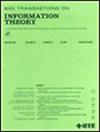Self-Orthogonal Codes From p-Divisible Codes
IF 2.2
3区 计算机科学
Q3 COMPUTER SCIENCE, INFORMATION SYSTEMS
引用次数: 0
Abstract
The self-orthogonality and divisibility are two important properties of linear codes. It is interesting to establish relationship between them. By the well-known Gleason-Pierce-Ward Theorem, all self-dual divisible codes have been totally classified. However, the relationship between the self-orthogonality and divisibility of a q-ary linear codes is known only for来自 p 分码的自正交码
自正交性和可整除性是线性码的两个重要性质。在他们之间建立关系是很有趣的。根据著名的格里森-皮尔斯-沃德定理,所有自对偶可除码都被完全分类。然而,只有在$q=2,3$时,Huffman和Pless在2003年才知道q元线性码的自正交性和可整除性之间的关系。它已经开放了20多年,以审理其他案件。本文的目的是在一定条件下解决这一开放问题,并构造新的自正交码族。设q是奇素数p的幂。首先,我们证明了在有限域${\mathbb {F}}_{q}$上任何包含全1向量的p可除码是自正交的。更一般地说,我们可以得出结论,在${\mathbb {F}}_{q}$上任何p可除的$[n,k]$线性码包含权值为n的码字,它单等价于${\mathbb {F}}_{q}$上的$[n,k]$自正交码。这个结果提供了一种从p可除码中寻找自正交码的有效方法。其次,我们将这一结果应用于构造具有优良参数或良好应用的自正交码。一方面,我们利用这一结果研究了广义Reed-Muller码、某些投影二权码和Griesmer码的自正交性。另一方面,利用这一有用的结果以及线性码的扩展和增广技术,我们构造了8个新的自正交可分码族。这些自正交码及其对偶包含许多最优或几乎最优码。此外,一些自正交码支持组合设计,并证明了其中一些自正交码是最优或几乎最优的局部可恢复码。
本文章由计算机程序翻译,如有差异,请以英文原文为准。
求助全文
约1分钟内获得全文
求助全文
来源期刊

IEEE Transactions on Information Theory
工程技术-工程:电子与电气
CiteScore
5.70
自引率
20.00%
发文量
514
审稿时长
12 months
期刊介绍:
The IEEE Transactions on Information Theory is a journal that publishes theoretical and experimental papers concerned with the transmission, processing, and utilization of information. The boundaries of acceptable subject matter are intentionally not sharply delimited. Rather, it is hoped that as the focus of research activity changes, a flexible policy will permit this Transactions to follow suit. Current appropriate topics are best reflected by recent Tables of Contents; they are summarized in the titles of editorial areas that appear on the inside front cover.
 求助内容:
求助内容: 应助结果提醒方式:
应助结果提醒方式:


